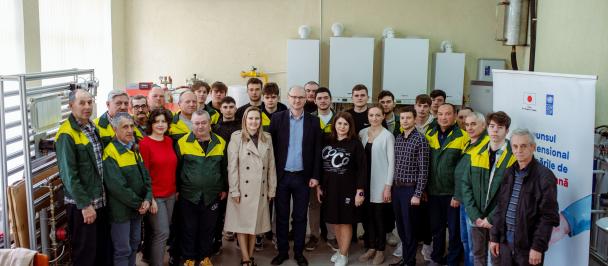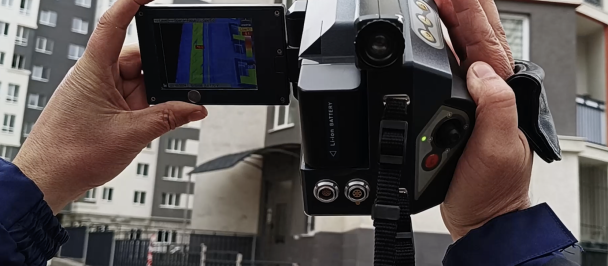UNDP Moldova contributes to the digitalization of the energy system by building a smart grid
April 22, 2024

A first batch of smart meters is currently being installed at consumers in several localities as part of a pilot programme carried out by the Ministry of Energy with the support of UNDP Moldova. The programme will be extended later, thanks to the financial support of the Italian Government, provided through UNDP.
Part of the meters are installed by Premier Energy Distribution in the municipality of Chișinău and six suburbs and another part - by RED Nord, in the northern region, including the suburb of Bălți. The meters are installed in households selected according to criteria of geographical location, population density, energy vulnerability, socio-economic status, availability of infrastructure, etc.
The smart meters will measure consumption at short intervals, energy quality parameters and transmit data automatically, securely and without errors to the energy supplier, without the need for employees of distribution companies to physically read the meters. At the same time, the supplier will bill actual energy consumption, not estimated one and the distributor will be able to identify accidents more quickly and reduce response time.
"This pilot programme will contribute to the digitalization of the energy sector, with smart meters being a necessary step towards the introduction of time-of-use differentiated electricity tariffs. Smart grids will enable better management of consumption and the integration of more locally produced renewable energy and ultimately reduce energy dependency and greenhouse gas emissions," said Cristina Pereteatcu, State Secretary at the Ministry of Energy.
The smart metering system will use PLC (Power Line Communication) technology, which uses power lines and the services of electronic communication operators, to transmit data to the central unit. The centralized data will be transmitted to a control system where it will be possible to analyze the evolution of consumer behaviour in relation to energy prices and develop informed policies.
According to Sergiu Petrea, Director of Premier Energy Distribution, "these meters provide the distribution operator with technical information that will allow better monitoring of energy flows, identification of commercial losses, improvement of the quality of distribution services provided, reduction of operational costs with an impact on electricity distribution tariffs".
The intelligent data logging system involves not only access to accurate data, but also monitoring of power quality parameters such as voltage, current, other necessary data that the customer can see through an application at any time, explains Viorel Corbu, technical director of RED Nord.
In the Bălțiul Nou neighborhood, RED Nord has combined the installation of smart meters with work to replace overhead power lines with underground networks, which contributes to increased safety and consumer protection.


With smart grids, customers have more freedom in choosing their supply offer, being able to opt for flexible tariffs, as the smart meter allows six types of tariffs to be stored. This will allow consumers to use their appliances at times when energy is cheaper. Smart appliances will be able to automatically "read" the tariffs from the meter and decide when the most convenient time is to switch on. Differentiated tariffs for consumers with smart meters could be part of another UNDP initiative in Moldova - the Innovative Energy Test Spaces or Sandbox. Differentiated tariffs could thus be applied in exempting from existing legislation to study consumer behaviour before extending the new tariff system nationwide.
The data collected under the programme will be used to develop new policies for more efficient consumption. The UNDP and EU are testing several technical solutions that can be extended to the whole country, including the pilot programme for the installation of smart meters, and the "Rabla for household appliances" programme to replace energy-guzzling appliances with energy-efficient ones.
More than 50% of meters in the EU are smart, which has reduced commercial consumption by up to 15% and technical consumption by 5%. Smart grids are driven by the need to minimize consumption worldwide to curb resource waste and global warming.

 Locations
Locations













